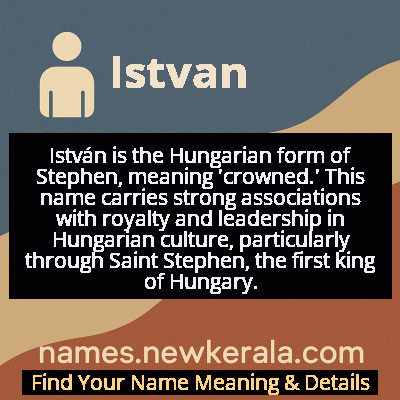Istvan Name Meaning & Details
Origin, Popularity, Numerology Analysis & Name Meaning of Istvan
Discover the origin, meaning, and cultural significance of the name ISTVAN. Delve into its historical roots and explore the lasting impact it has had on communities and traditions.
Name
Istvan
Gender
Male
Origin
Hungarian
Lucky Number
4
Meaning of the Name - Istvan
István is the Hungarian form of Stephen, meaning 'crowned.' This name carries strong associations with royalty and leadership in Hungarian culture, particularly through Saint Stephen, the first king of Hungary.
Istvan - Complete Numerology Analysis
Your Numerology Number
Based on Pythagorean Numerology System
Ruling Planet
Uranus (Rahu)
Positive Nature
Strong sense of order, loyal, practical, and disciplined.
Negative Traits
Stubborn, overly serious, rigid, and prone to feeling restricted.
Lucky Colours
Blue, gray.
Lucky Days
Saturday.
Lucky Stones
Blue sapphire.
Harmony Numbers
1, 7, 8.
Best Suited Professions
Managers, engineers, accountants, organizers.
What People Like About You
Dependability, discipline, practicality.
Famous People Named Istvan
István I
King
First King of Hungary who established the Hungarian state and Christianity
István Széchenyi
Statesman and Reformer
Known as 'The Greatest Hungarian' for his modernization efforts and founding the Hungarian Academy of Sciences
István Örkény
Writer
Renowned Hungarian playwright and novelist known for his absurdist works
István Csurka
Politician and Writer
Founder of the Hungarian Justice and Life Party and prominent nationalist figure
Name Variations & International Equivalents
Click on blue names to explore their detailed meanings. Gray names with will be available soon.
Cultural & Historical Significance
The name carries the weight of Hungary's conversion to Christianity and its establishment as a European kingdom under Stephen I's reign. Even today, the name evokes images of the Holy Crown of Hungary and the nation's thousand-year history, serving as a powerful symbol of Hungarian heritage and continuity. The cultural importance of István extends beyond royalty to encompass the entire Hungarian national narrative, representing both the glorious past and enduring spirit of the Hungarian people.
Extended Personality Analysis
Individuals named István are often perceived as strong, reliable, and traditional, reflecting the name's royal and saintly associations. They tend to exhibit leadership qualities, responsibility, and a deep sense of cultural pride. Many Istváns are seen as grounded individuals with strong family values and a respect for heritage. The name suggests someone who is dependable, principled, and often takes on leadership roles naturally.
There's an expectation of wisdom and maturity associated with the name, likely stemming from its connection to King Saint Stephen, who was known for his statesmanship and vision. These individuals are typically viewed as having a strong moral compass and a commitment to their community and traditions. While maintaining traditional values, many Istváns also demonstrate adaptability and practical intelligence, balancing respect for the past with engagement in the present. The name carries an implicit expectation of dignity and reliability in personal and professional relationships.
Modern Usage & Popularity
István remains a classic and respected name in modern Hungary, though its popularity has fluctuated over recent decades. While it was extremely common in previous generations, it has become less frequent among newborns in the 21st century, often perceived as somewhat traditional or old-fashioned. However, it maintains strong cultural resonance and continues to be chosen by families wanting to honor Hungarian heritage. The name appears across all age groups in Hungary and among Hungarian diaspora communities worldwide. Recent years have seen a slight revival of traditional Hungarian names, which may contribute to István's enduring presence. It ranks consistently within the top 100 male names in Hungary, demonstrating its lasting appeal despite changing naming trends.
Symbolic & Spiritual Meanings
Symbolically, István represents crown, authority, foundation, and spiritual leadership. The name carries connotations of royalty, sanctity, and national identity. It symbolizes the establishment of order from chaos, much like King Stephen's transformation of pagan tribes into a Christian kingdom. The crown imagery suggests not just political power but also responsibility, duty, and the weight of tradition. In a broader sense, István represents the bridge between Hungarian pagan past and European Christian future, embodying transformation and cultural synthesis. The name also symbolizes endurance and continuity, reflecting Hungary's thousand-year history and cultural persistence through various challenges and changes.

